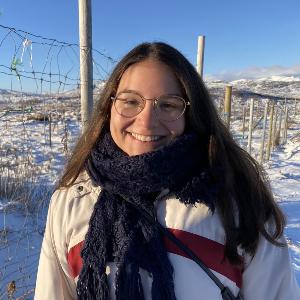The Nexus Group introduces itself: Mariangela Varela
7 May 2025
In this series, members of our research group introduce themselves through three questions. Next up: Mariangela Varela
7 May 2025
In this series, members of our research group introduce themselves through three questions. Next up: Mariangela Varela

© Mariangela Varela
Mariangela Varela studied Physics for her Bachelor's degree at the University of Glasgow. She then came to Munich for her Physics master, in which she specialized in environmental topics and came to the Department of Geography at LMU for her PhD studies. She is currently researching snow droughts, using the LPJmL model.
Which researcher or research do you find inspiring?
I’m going to answer this in a more general sense: for me, an inspiring researcher—especially in the field of environmental studies—is someone who practices what they advocate. Our work is about understanding how humans can live and thrive within planetary boundaries, and while there’s no perfect way to do this, and everyone has limitations, I’m inspired by those who try. I relate to this personally: I’m originally from Panama, so I occasionally need to fly home, but I try to make conscious choices within my own limits—like not eating meat, taking the bike, avoiding flying when I can, etc. So, I am inspired when I see a researcher implementing small but meaningful changes in their life, I think it reflects a genuine commitment to change, which is exactly what draws me to this field in the first place —and if we already know which actions are beneficial, why not start by integrating them into our daily lives?
How would you explain you research to a 10-year-old?
Climate change means that temperatures rise. It’s getting warmer. And this is affecting many different things, including how much and where snow falls. So, in short: a warming climate affects snow patterns. Many plants and trees rely on the water from the melting snow in spring. They need the water to grow. But now, with the changing snow patterns, many ecosystems will no longer have the expected spring snowmelt. We want to understand what areas are dependent on the water that comes from melting snow, and how badly would they be affected by these changing snow patterns. We could also ask ourselves: could these snow patterns have potential benefits in other areas? Maybe some areas benefit from having less snow!
What excites you most about your research?
We try to understand how snow droughts affect ecosystem productivity, and what I find most interesting about it is uncovering the underlying interactions that give rise to what we observe and measure. Our variables are rather simple: precipitation, snow, plant productivity. However, the interaction of these variables is quite complex, there are so many factors we have to consider to detect a signal between all the noise. Just one tiny thing can affect so much else. It is a big challenge, but this is crucial to get a better understanding of earth systems, which ultimately is important to learn how to live with nature in a sustainable way and manage our resources better. Fundamentally, uncovering this knowledge is part of what we need to become a more sustainable society.